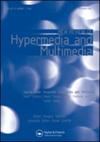Invited papers from the ACM conference on hypertext and social media
IF 0.8
4区 计算机科学
Q3 COMPUTER SCIENCE, INFORMATION SYSTEMS
引用次数: 0
Abstract
This Special Issue presents three invited papers, selected from among the best contributions that were presented at the 2017 ACM International Conference on Hypertext and Social Media (HT 2017) held in Prague, Czech Republic on 4–7th July 2017. Since 1987, HT has successfully brought together leading researchers and developers from the Hypertext community. It is concerned with all aspects of modern hypertext research, including social media, adaptation, personalisation, recommendations, user modelling, linked data and semantic web, dynamic and computed hypertext, and its application in digital humanities, as well as with interplay between those aspects such as linking stories with data or linking people with resources. The call for papers of HT 2017 was organised into four technical tracks: Social Networks and Digital Humanities (Linking people), Semantic Web and Linked Data (Linking data), Adaptive Hypertext and Recommendations (Linking resources), News and Storytelling (Linking stories). The Program Committee of HT 2017 accepted 19 papers (acceptance rate 27%) for regular presentation, and an additional 12 short-presentation papers. In addition, the conference featured four demonstrations and two keynotes: Kristina Lerman and Peter Mika. The three papers selected for this Special Issue cover a diverse set of topics, well representing the spectrum of topics that were discussed at HT 2017. The first paper, entitled “Implicit Negative Link Detection on Online Political Networks via Matrix Tri-Factorizations” (Ozer, Yildirim and Davulcu), deals with the prediction of negative connections between users of online political networks. Currently, the majority of social media sites do not support explicit negative links between participating users. However, the very nature of the political discourse often involves users in discussing controversial political issues, which results in a series of agreements and disagreements. The authors present a technically sound approach to extracting negative links from a variety of online political platforms by using a matrix factorisation approach. Matrix factorisation is extended in multiple ways to reflect the information that can be found in the sentiment of the written comments as well as the social balance theory known from the social sciences. The paper concludes with a range of experiments on the real datasets using the Twitter accounts of the politicians of the major UK political parties. The experiments show an improved accuracy of the community detection methods applied on the networks with the extracted negative interaction links as compared to the application of these methods on the networks having only positive links. The second paper, entitled “Hybrid Recommendations by Content-Aligned Bayesian Personalized Ranking” (Peska) focuses on recommender systems that seek to predict the "rating" or "preference" a user would give to an item and hence enabling to display items in order the user might find interesting. A special problem is cold-start recommendation, i.e. for a new user or of a new item. The author proposes a hybrid recommendation technique “ContentAligned Bayesian Personalized Ranking” (CABPR) with several variants. This is based on an existing Bayesian Personalized Ranking matrix factorization (BPR) by Rendle et al. CABPRACM超文本和社交媒体会议邀请论文
本期特刊介绍了三篇受邀论文,这些论文是从2017年7月4日至7日在捷克布拉格举行的2017年ACM超文本和社交媒体国际会议(HT 2017)上发表的最佳贡献中挑选出来的。自1987年以来,HT成功地将超文本社区的主要研究人员和开发人员聚集在一起。它涉及现代超文本研究的各个方面,包括社交媒体、改编、个性化、推荐、用户建模、关联数据和语义网、动态和计算超文本及其在数字人文学科中的应用,以及这些方面之间的相互作用,例如将故事与数据联系起来或将人与资源联系起来。2017年的论文征集分为四个技术方向:社交网络和数字人文(连接人)、语义网和关联数据(连接数据)、自适应超文本和推荐(连接资源)、新闻和讲故事(连接故事)。ht2017计划委员会接受了19篇论文(录取率27%)作为常规报告,另外还有12篇简短报告。此外,会议还包括四个演示和两个主题演讲:Kristina Lerman和Peter Mika。本特刊精选的三篇论文涵盖了一系列不同的主题,很好地代表了在2017年HT上讨论的主题范围。第一篇论文题为“通过矩阵三因子化对在线政治网络的隐式负面链接检测”(Ozer, Yildirim和Davulcu),涉及在线政治网络用户之间负面连接的预测。目前,大多数社交媒体网站不支持参与用户之间明确的负面链接。然而,政治话语的本质往往涉及到用户讨论有争议的政治问题,这导致了一系列的同意和分歧。作者提出了一种技术上合理的方法,通过使用矩阵分解方法从各种在线政治平台中提取负面链接。矩阵分解以多种方式扩展,以反映可以在书面评论的情绪以及社会科学中已知的社会平衡理论中找到的信息。论文最后用英国主要政党的政治家的Twitter账户对真实数据集进行了一系列实验。实验表明,与仅具有正交互链接的网络相比,应用于提取负交互链接的网络上的社区检测方法具有更高的准确性。第二篇论文题为“基于内容对齐贝叶斯个性化排名的混合推荐”(Peska),主要关注的是寻求预测用户对商品的“评级”或“偏好”的推荐系统,从而能够按照用户可能感兴趣的顺序显示商品。一个特殊的问题是冷启动推荐,即针对新用户或新项目。作者提出了一种具有多种变体的混合推荐技术“内容对齐贝叶斯个性化排名”(CABPR)。这是基于Rendle等人现有的贝叶斯个性化排名矩阵分解(BPR)。CABPR
本文章由计算机程序翻译,如有差异,请以英文原文为准。
求助全文
约1分钟内获得全文
求助全文
来源期刊

New Review of Hypermedia and Multimedia
COMPUTER SCIENCE, INFORMATION SYSTEMS-
CiteScore
3.40
自引率
0.00%
发文量
4
审稿时长
>12 weeks
期刊介绍:
The New Review of Hypermedia and Multimedia (NRHM) is an interdisciplinary journal providing a focus for research covering practical and theoretical developments in hypermedia, hypertext, and interactive multimedia.
 求助内容:
求助内容: 应助结果提醒方式:
应助结果提醒方式:


